With the increase of electric vehicles (EVs) on the road, aka the burgeoning of the “Electric Highway,” unified standards for public EV charging are needed. In many states, this will fall on the weights and measures officials. As more plug-in EVS hits U.S. roads, charging stations will require inspection and testing for accuracy, just like a gas station today. As the infrastructure rolls out, accruacy, labeling and advertising requirements will need to be addressed.
The National Conference on Weights and Measures (NCWM) established the kilowatt hour as the appropriate method of sale of electricity for electric automobiles, effective January 1, 2014. This was at the recommendation of a U.S. National Working Group established by the National Institute of Standards and Technology (NIST). By establishing the measured units of sale, consumers are now able to make price comparisons just as they do for gasoline.
 At its 100th Annual Meeting in July 2015 in Philadelphia, NCWM will vote on additional recommendations from the NIST work group that would establish standards for recharging stations including accuracy requirements, testing procedures by weights and measures officials and design and installation requirements such as indications, labeling and security from tampering. All of this will enable the same level of regulatory oversight that already exists for gas pumps. If adopted by NCWM in July, those model standards will be published in NIST Handbook 44 and enforceable effective January 1, 2016.
At its 100th Annual Meeting in July 2015 in Philadelphia, NCWM will vote on additional recommendations from the NIST work group that would establish standards for recharging stations including accuracy requirements, testing procedures by weights and measures officials and design and installation requirements such as indications, labeling and security from tampering. All of this will enable the same level of regulatory oversight that already exists for gas pumps. If adopted by NCWM in July, those model standards will be published in NIST Handbook 44 and enforceable effective January 1, 2016.
Carol Hockert, chief of the NIST Office of Weights and Measures (OWM) noted, “NCWM and NIST have worked in partnership since 1905 to develop standards covering commercial weighing and measuring practices. It is a never-ending task as manufacturing, marketing and new technologies rapidly evolve.”
She also explained that OWM personnel at NIST serve as technical advisors on NCWM Committees and serve as liaisons between NCWM and federal agencies. These two organizations are devoted to a common cause: strengthening the nation’s weights and measures infrastructure and in doing so, protecting consumers and giving business owners a level playing field through fair competition.

